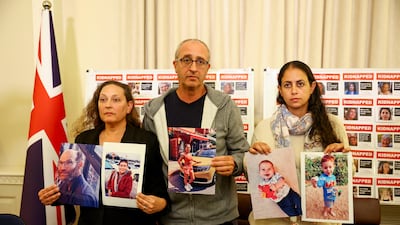Live updates: Follow the latest news on Israel-Gaza
Families of hostages held by Hamas have made emotional pleas for their loved ones to be brought home.
British-Israeli Ayelet Svatitzky said she has been counting the days since her brother was killed, and her mother and other brother were kidnapped in the attack on southern Israel on October 7.
Speaking at a press conference at the Israel embassy in London, she recalled frantically calling her family on the morning of the raid to ensure they were safe. “For the first few hours, I thought they were gone – dead. I thought I had lost them,” she said.
Learning that her diabetic mother and brother had been kidnapped “hit really hard”.
“I don’t know what was the better option: being killed, or being kidnapped by Hamas,” she said.
She has had no time to grieve, as she attempts to receive news of her kidnapped family while going through the process of identifying her brother’s body. “I am chasing dental records or X-rays or filling forms, trying to identify my brother’s body,” she said.
“I am clinging to the hope that my mum knows that I love her. When my mum and brother are back, I want them to know that I did everything in my power [to help bring them back],” she said.
“I am here to raise awareness. This is a humanitarian crisis, a war crime. This isn’t a political issue.”

Alongside her, Ofri Bibas Levi, whose brother, sister-in-law and two children, aged four and nine months, are being held in Gaza, said she had been “living a nightmare”.
“I feel guilt for sleeping in my bed, and cuddling my children at night,” she said.
The only news she has had of her family was a video of her captive sister-in-law and children, and days later, a photo of her brother with his head bleeding.
British-Israeli David Barr, who grew up in Leeds but moved to Israel in 1984, said his sister-in-law Naomi Shitrit was killed in the Hamas attack. She had been shot “at point-blank range” while on a morning run, he said.
“It’s been easier to bury our loved ones than to go through the anguish that the [families of hostages] are going through,” he said.

Mr Barr recounted the terrifying hours his family spent sheltering during the attack, scattered across various homes and kibbutzim. His sister-in-law had been missing and her body was identified days later. “For a short time we were in their shoes,” he said, of the hostages' families. “It was a relief that she was dead and had been shot.”
Asked whether they had concerns about a ground invasion putting the hostages at risk, the family members agreed but added they had to “trust” the Israeli government’s decisions. “I’m not a politician or an army person. I just want our hostages back home,” Ms Levi said.
“I’m afraid of it happening but I have to trust that it’s the best way for the Israeli government to get our families back.”
Ms Svatitzky said Israel had a dual remit – to protect the hostages but also to ensure her family could continue to live safely in southern Israel.
“Israel has a responsibility for hostages and for their release,” she said. “But they also have a responsibility for life to exist on the border of Gaza.”

